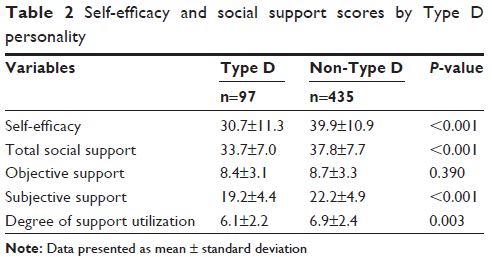109568
论文已发表
注册即可获取德孚的最新动态
IF 收录期刊
- 3.4 Breast Cancer (Dove Med Press)
- 3.2 Clin Epidemiol
- 2.6 Cancer Manag Res
- 2.9 Infect Drug Resist
- 3.7 Clin Interv Aging
- 5.1 Drug Des Dev Ther
- 3.1 Int J Chronic Obstr
- 6.6 Int J Nanomed
- 2.6 Int J Women's Health
- 2.9 Neuropsych Dis Treat
- 2.8 OncoTargets Ther
- 2.0 Patient Prefer Adher
- 2.2 Ther Clin Risk Manag
- 2.5 J Pain Res
- 3.0 Diabet Metab Synd Ob
- 3.2 Psychol Res Behav Ma
- 3.4 Nat Sci Sleep
- 1.8 Pharmgenomics Pers Med
- 2.0 Risk Manag Healthc Policy
- 4.1 J Inflamm Res
- 2.0 Int J Gen Med
- 3.4 J Hepatocell Carcinoma
- 3.0 J Asthma Allergy
- 2.2 Clin Cosmet Investig Dermatol
- 2.4 J Multidiscip Healthc

D 型人格作为 2 型糖尿病患者自我效能和社会支持的预测因子
Authors Shao Y, Yin H, Wan C
Received 22 November 2016
Accepted for publication 7 February 2017
Published 20 March 2017 Volume 2017:13 Pages 855—861
DOI https://doi.org/10.2147/NDT.S128432
Checked for plagiarism Yes
Review by Single-blind
Peer reviewers approved by Prof. Dr. Roumen Kirov
Peer reviewer comments 3
Editor who approved publication: Professor Wai Kwong Tang
Objective: The aim of this study was to estimate the prevalence of Type D personality
and assess the relationship between this personality type and
self-efficacy/social support in Chinese patients with type 2 diabetes mellitus
(T2DM).
Patients and methods: From January 1, 2014, to July 31, 2014, 532
consecutive patients with T2DM were recruited from two hospitals in Guangzhou,
China. The participants completed questionnaires containing questions about
sociodemographic characteristics, Type D personality, self-efficacy, and social
support scales, and their medical records were reviewed for additional data.
Results: Of the 532 patients, 18.2% had Type D personality.
Patients with this personality type reported significantly lower levels of
self-efficacy (P <0.001), total social support
(P <0.001), subjective support (P <0.001), and support utilization
(P =0.003), but similar level of
objective support (P =0.314), compared
to those of patients without Type D personality. Negative affectivity and
social inhibition, two intrinsic traits of Type D personality, negatively
correlated with self-efficacy and social support scores. Type D personality was
significantly associated with less self-efficacy and social support (P <0.001), controlling for other
sociodemographic factors. Glycosylated hemoglobin (HbA1c) levels were
significantly higher in T2DM patients with Type D personality than in patients
with non-Type D personality.
Conclusion: This study provides new evidence linking Type D
personality with self-efficacy, social support, and poor glycemic control,
highlighting the special need for care among T2DM patients with Type D
personality.
Keywords: Type D personality, social support,
self-efficacy, glycemic control, type 2 diabetes mellitus
